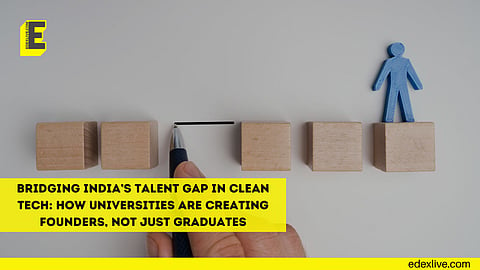

India's clean tech industry is growing rapidly, driven by a countrywide initiative towards sustainability and climate action. India plans to achieve 500 GW of non-fossil energy capacity by 2030 — a target which would need an investment of $385 billion, according to Moody's Ratings.
India invested nearly $13 billion in renewable energy projects in 2023 alone, which speaks volumes about the size at which the sector is expanding. Yet what is shocking is that there could be an enormous talent bottleneck hindering the advance. Simply put, India will need specialists in handling the innovation of renewable energy, green manufacturing, waste management, and other clean technologies.
In order to close the gap, the country's education system will have to undergo a significant shift beyond classrooms to create founders to guide the sector.
Many universities are addressing this challenge today by changing the way they educate in the clean tech field. They are not just focusing on producing graduates with theoretical knowledge. Instead, they are aiming to create entrepreneurs who can bring about a change.
This change is vital as the clean tech industry needs skills such as practical problem-solving, innovation, and adaptability, and these can be acquired through experiential learning.
One of the new approaches is the establishment of multi-disciplinary manufacturing labs and production facilities on campuses, through which students get hands-on exposure in real-life settings. The labs simulate factory environments where students can prototype and test clean technologies, from solar panels and energy-efficient appliances to green materials.
Through direct engagement with equipment and processes, students acquire essential technical skills, closing the gap between classroom concepts and factory practices.
This is complemented by an emphasis on action learning labs, where students handle live projects and interact with startups or industry champions. This learning model inculcates an entrepreneurial mindset, calling on students to identify market opportunities, develop innovative solutions, and define business strategies.
The outcome? Graduates who are not just job-ready but prepared to start their own clean tech startups or drive innovation in existing businesses.
Also, promoting inclusivity and accessibility, lateral entry schemes in some universities provide an easy transition for diploma holders or professionals to shift to degree courses.
As a flexible route of entry, this option introduces diversity in types of talent, including mid-career changers who are interested in clean technology, into the learning landscape.
These innovations align well with the vision of India's National Educational Policy (NEP) 2020 which promotes multidisciplinary education, vocational training, and skill development. With NEP principles, these institutions prepare students not only for job placement but for long-term leadership in innovation and sustainability.
In short, filling India's clean tech talent gap calls for education systems to move beyond traditional degree programs. With investments in manufacturing laboratories, action-learning centres, and diversity-based admissions strategies, universities are creating a new generation of founders — graduates with technical expertise, business acumen, and dedication. These game-changers will shape India's future in clean tech, enabling the country to reach its environmental goals while fuelling economic growth and employment.
(Prof Supriya Pattanayak is the Vice-Chancellor of Centurion University, Odisha. Views expressed are her own.)
